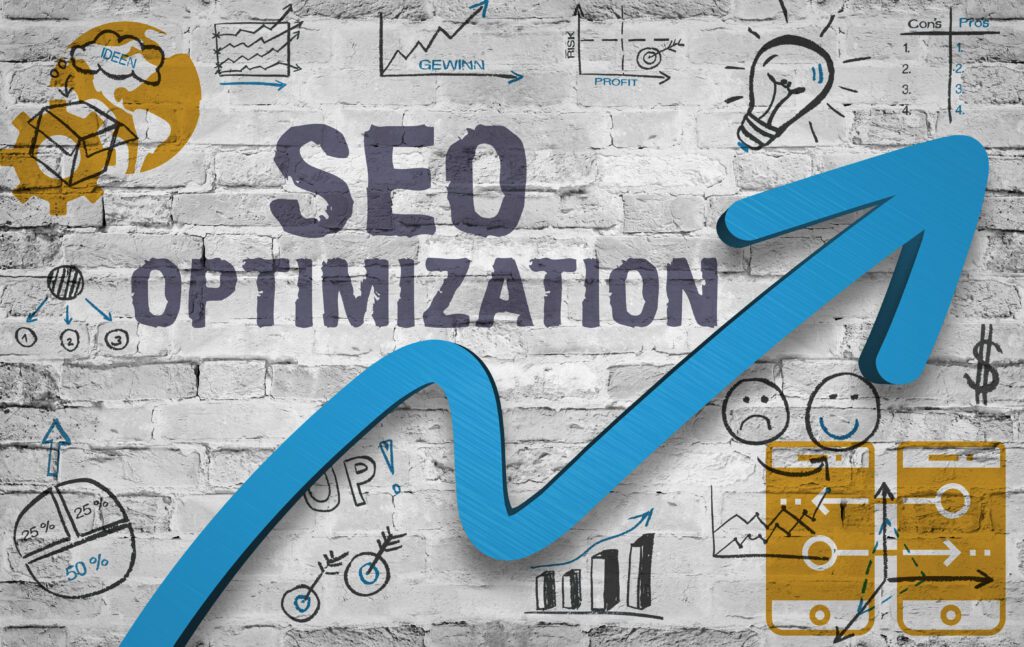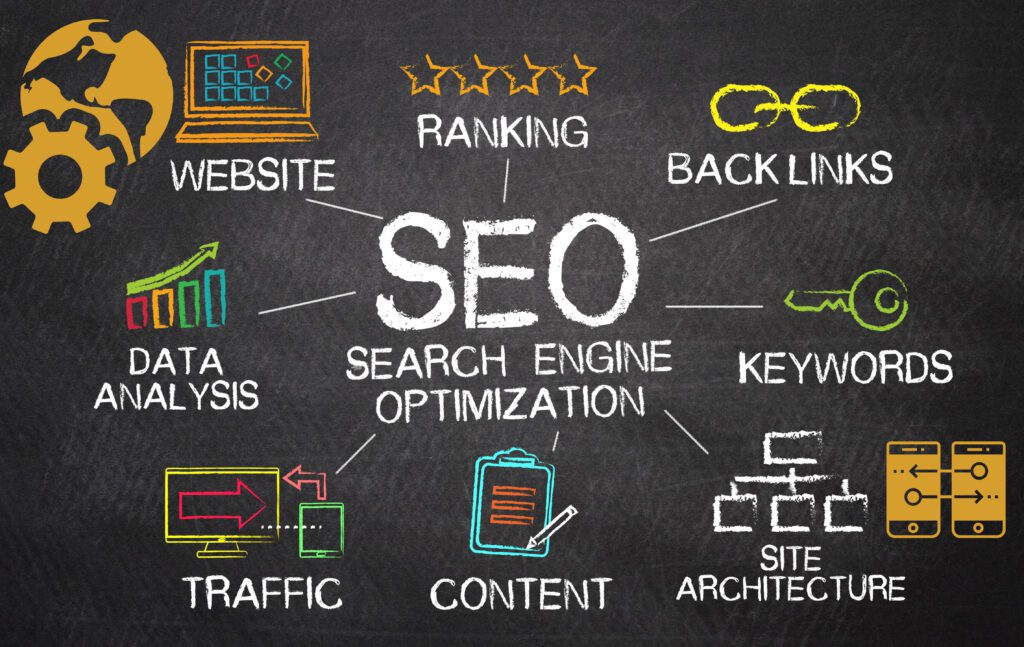In 2023, the power of Search Engine Optimization (SEO) in B2B marketing continues to be a critical factor that businesses cannot afford to ignore. SEO plays a vital role in driving organic traffic, increasing brand visibility, and generating valuable leads for B2B companies. Here are some reasons why SEO remains essential
1-Increased Online Visibility:
With the proliferation of online channels and the rise of digital marketing, businesses must stand out in the search engine results pages (SERPs) to attract potential customers. SEO helps optimize your website and content to rank higher in search engines, making it easier for your target audience to find you when they search for relevant keywords.
2-Targeted Traffic:
B2B companies often have specific target audiences, such as decision-makers, industry professionals, or businesses in a particular sector.in wesocialhub SEO allows you to optimize your website and content for relevant keywords and phrases that your target audience is actively searching for. By appearing in front of the right people, you can drive highly targeted traffic to your website, increasing the chances of generating quality leads.
3-Trust and Credibility:
Ranking high in search engine results is often associated with credibility and trustworthiness. When your website appears at the top of the search results, it signals to potential customers that you are a reputable and authoritative source in your industry. SEO helps build trust and credibility, making it more likely for B2B buyers to consider your products or services.
4-Long-Term Results:
SEO is a long-term strategy that can provide ongoing benefits for your B2B marketing efforts. While it may take time to see significant results, the efforts put into optimizing your website and content can have a lasting impact. By consistently producing high-quality, optimized content and maintaining a strong online presence, you can continue to attract organic traffic and generate leads over time.
5-Cost-Effectiveness:
Compared to other digital marketing tactics, SEO can be a cost-effective strategy in the long run. While there may be initial investments required for optimizing your website and creating quality content, the ongoing costs of maintaining and improving your SEO efforts are typically lower than other paid advertising methods. Additionally, the organic traffic generated through SEO does not require continuous payments per click or impression, making it a valuable investment for B2B companies.
6-Integration with Other Channels:
in wesocialhub SEO can complement and enhance other marketing channels. For instance, content marketing and SEO go hand in hand, as optimized content helps improve search engine rankings while providing valuable information to your target audience. By integrating SEO with other marketing strategies, such as social media marketing or email marketing, you can create a cohesive and powerful marketing approach that drives better results.


6 Tips For Developing An Effective B2B SEO Strategy in 2023
Certainly! Here are six tips for developing an effective B2B SEO strategy in 2023:
- Understand Your Target Audience: Start by conducting thorough research to understand your B2B target audience, their needs, pain points, and search behaviors. Develop buyer personas and create content that aligns with their interests and challenges. This will help you optimize your SEO efforts to attract the right audience.
- Conduct Comprehensive Keyword Research: Keyword research remains a vital aspect of SEO. Use keyword research tools to identify relevant keywords and phrases that your target audience is using to search for your products or services. Focus on long-tail keywords that have lower competition but higher intent. Incorporate these keywords naturally into your website content, meta tags, headings, and URLs.
- Optimize On-Page Elements:in wesocialhub Pay attention to on-page optimization to ensure search engines understand the relevance and context of your website pages. Optimize your page titles, meta descriptions, headings, and URLs with target keywords. Make sure your content is well-structured, easy to read, and includes relevant information that addresses your audience’s needs. Additionally, optimize your images by using descriptive alt tags and compressing them for faster page load times.
- Build High-Quality Backlinks: Building high-quality backlinks from reputable and relevant websites remains crucial for SEO success. Focus on acquiring backlinks from authoritative B2B websites, industry publications, and influential thought leaders. Invest in content marketing, guest blogging, and outreach campaigns to generate quality backlinks. Additionally, leverage social media platforms to amplify your content and attract shares and engagement.
- Prioritize User Experience (UX): User experience plays a vital role in SEO. Ensure your website is optimized for mobile devices, as mobile-friendly websites are favored by search engines. Improve website loading speed by optimizing images, leveraging caching, and minimizing code. Make sure your website navigation is intuitive, and your content is easily accessible. Providing a seamless and user-friendly experience will not only improve your search rankings but also increase conversions.
- Monitor, Analyze, and Adapt: Regularly monitor your SEO efforts and analyze the results to identify areas for improvement. Utilize tools like Google Analytics and Google Search Console to track your website’s performance, traffic sources, and keyword rankings. Make data-driven decisions to adapt your SEO strategy accordingly. Stay up to date with the latest SEO trends and algorithm updates to ensure your strategy remains effective.
Remember, in wesocialhub SEO is an ongoing process, and it takes time to see significant results. Consistency, patience, and adapting to changes in the SEO landscape are key to developing a successful B2B SEO strategy in 2023
Build B2B Buyer Personas
1 / 1
Sure! Buyer personas are fictional representations of your ideal customers based on market research and real data about your existing customers. They help you understand your target audience better and tailor your marketing and sales strategies to meet their specific needs. Here’s how you can build B2B buyer personas:
- Conduct Market Research: Start by gathering information about your target market. Identify the industries and types of businesses you want to target. Research market trends, challenges, and opportunities within those industries.
- Analyze Existing Customer Data: Look at your existing customer base and identify common characteristics among your most valuable and satisfied customers. Consider factors such as company size, industry, location, job title, pain points, and purchasing behaviors.
- Interview Customers and Sales Team: Conduct interviews with your existing customers and sales team to gain deeper insights into their motivations, goals, challenges, and buying preferences. Ask questions about their decision-making process, what they value in a solution, and why they chose your product or service.
- Identify Common Patterns: in wesocialhub Look for patterns and similarities in the information you’ve gathered. Group customers with similar characteristics and behaviors together.
- Create Persona Profiles: Based on your research and analysis, develop detailed persona profiles for each target segment. Include demographic information, job titles, company details, goals, pain points, decision-making criteria, preferred communication channels, and any other relevant information.
- Give Your Personas Names: Assign names to your buyer personas to make them more relatable and memorable. For example, “Marketing Manager Mary” or “IT Director David.”
- Validate Your Personas: Share your personas with your sales and marketing teams and gather their feedback. Ensure that the personas accurately represent your target audience and resonate with the teams who will be using them.
- Use Personas for Targeting and Messaging: Utilize your buyer personas to inform your marketing and sales strategies. Tailor your messaging, content, and communication channels to match the preferences and needs of each persona. Develop targeted campaigns and personalized experiences based on the characteristics of each buyer persona.
Remember, buyer personas are not static and should be periodically updated as you gather more data and insights. Regularly review and refine your personas to ensure they accurately reflect your target market and customer base
Perform Keyword Research
Performing keyword research is a critical aspect of B2B SEO since it is the first step of every campaign. This method involves identifying the keywords and phrases your target audience uses to search for your products or services.
height-inpage-display-project-management
Use keyword research tools like Google Keyword Planner, Google Trends, or SEMrush to find relevant keywords with high search volume and low competition. Focus on long-tail keywords because they are more specific and have a higher chance of ranking.
Understand A Complex Sales Funnel
A complex sales funnel involves multiple stages. Understanding a complex sales funnel is crucial for businesses because it allows them to effectively guide potential customers through the sales process, ultimately leading to more sales and revenue.
Below are the five stages of the complex sales funnel:
Once you have an in-depth understanding of complex sales funnels, you can easily create more engaging and relevant campaigns that attract and nudge your target audience to take action.
Conduct Competitors’ Analysis in wesocialhub
Another thing you need to do to develop an effective B2B SEO strategy is to conduct your competitors’ performance. Doing so should help you learn more about your competitors, including whether or not their campaigns are working in their favour.
You can use tools like Google AdWords Keyword Planner for competitors’ analysis. With Google AdWords Keyword Planner, you can find the keywords they are targeting. Go to the Keyword Planner tool and select “Find new keywords”. Enter your competitor’s website or landing page, and the tool will generate a list of keywords that they are targeting.
You should also consider reading online reviews. These pieces of feedback will allow you to know what their previous and current clients thought about them and the services they executed.
Having more cards in your sleeves will allow you to come up with better ways to increase website traffic, leads, and conversions. In that case, create a competitive analysis table to compare your business with all of your competitors. It will help you see the weaknesses and strengths of everyone at a glance.
Leverage Local SEO
Do you have a physical business location? If so, local SEO can help you reach potential customers in your proximity. Start optimising your Google Business Profile (GBP) with accurate information, including your business name, address, and phone number.
Use local keywords in your content and metadata. For example, if you own a children’s clothing store, you can add ‘in Singapore’ at the end or ‘near me’ so your content will appear in front of the people using this type of search intent. Local SEO is actually one of the many services that Singapore’s esteemed SEO agency OOm offers.
You may also include a particular location in wesocialhub where you want your target audience to visit in person. Encourage your clients to leave positive reviews on your GBP about their experience while working with you for the past weeks or months.
Optimise Metadata
Metadata are meta descriptions and meta titles of a website’s pages. Optimising metadata helps search engine bots understand the content of web pages, which aids in indexing and determines whether the material is relevant to searchers’ queries.
There are two things to take into consideration when optimising metadata: keywords and character count.
Keywords: The words or phrases added should be relevant to the web page’s content.
Character count: The maximum number of characters you can use for the meta description and meta title. Otherwise, texts that exceed the character count will not be visible on SERPs.
Meta Description: 150 – 160 characters
Meta Title – 50 – 60 characters
Embrace B2B SEO Today!
The longer sales cycles make B2B SEO difficult for organisations since it requires more attention and time. In addition, B2B websites can have more intricate technical requirements, which makes it more challenging to guarantee that all on-page and technical SEO components are in place.
You can overcome these obstacles and get the best results if you know the proper strategies to implement to promote your B2B website.






